
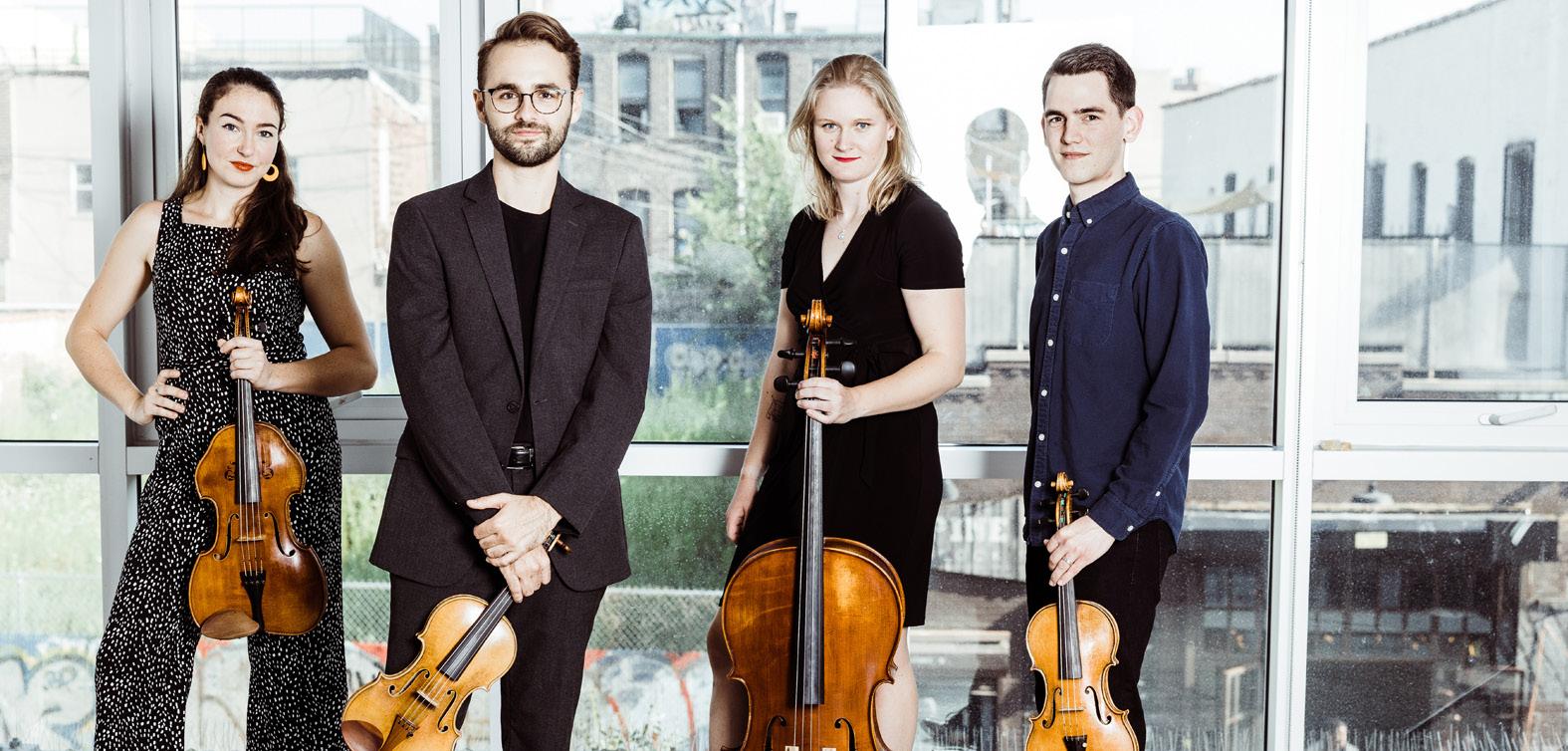



COLUMBUS Visit ChamberMusicColumbus.org for April & May concert info! Callisto Quartet Feb. 18, 2023 @ 4pm ANNIVERSARY Cavani String Quartet Jan. 28, 2023 @ 4pm at the Southern Theatre D R . MARKLOMAX II, composer L OUISETOPPIN, soprano ROK I N E FUJIWARA,composer
JACCI DELANEY
Glass sculpture artist with Glass Axis Learn more about Jacci’s story and other Columbus artists, performances, exhibitions, concerts, public art and more at ColumbusMakesArt.com.

CHAMPIONING ART AND ADVANCING CULTURE.
GCAC.ORG

Design: Formation Studio
#artmakescbus
The Celebration Continues!
We are grateful for YOU, your contributions of time, your attendance, and your financial support. A special thank you to those of you who sponsored our commissions for this season. Already we are hearing reports of these pieces being performed around the country for other audiences, a testament to the vision of our 75th season committee.

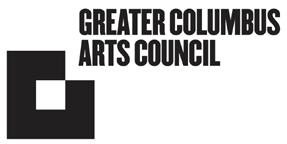
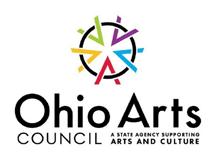



Chamber music is the essence of collaboration. We look forward to sharing our 2023-24 season with you in the coming months which will again include our collaboration with VIVO. As we look back on our history, we are proud of our many associations with musicians from around the world and of the many supporters who have served our organization in the many roles it takes to bring world-class concerts to our community. We are grateful to be able to present our concerts in the beautiful and acoustically superior Southern Theatre.

As you may know, on February 18, 2023, the fourth concert of the season, we originally scheduled to present the St. Lawrence String Quartet, for whom the world premieres by Ching-chu Hu and Korine Fujiwara were composed. On October 19, 2022, however, Geoff Nuttall (1965-2022) co-founder and first violinist of the St. Lawrence String Quartet, died of pancreatic cancer at the age of 56. Because of Mr. Nuttall’s tragic passing, St. Lawrence is unable to perform in February. But in its place, we are thrilled to present the Callisto Quartet. Like St. Lawrence, the quartet claims both Canadian and U.S. roots. This talented group of young musicians is definitely making a mark and receiving recognition as a rising star in the world of chamber music.

1
Welcome to the continuation of our 75th season, a time of celebration and renewal.
In harmony, Katherine Borst Jones, President
Our Partners in the Arts
About Chamber Music Columbus
What is Chamber Music?
ANNIVERSARY
Chamber music once meant Western classical music performed by small ensembles without a conductor. Today, chamber music groups also perform many different types of music from all over the world featuring voices, electronic and acoustic instruments, and compositions by contemporary composers.
Our Mission Chamber Music Columbus is a non-profit organization. The mission of Chamber Music Columbus is to enrich the collective cultural life of central Ohio through the love and celebration of chamber music, and by engaging the community through educational programming that elevates chamber music as an art form. We also promote the awareness and appreciation of chamber music in central Ohio.
How We Are Different
Since our founding in 1948, we have been a presenting organization. In other words, we do not have our own resident ensembles or orchestra. We fulfill our unique mission by inspiring the community through the presentation of renowned and promising chamber music ensembles from around the world. We usually present six different concerts a season at the historic and acoustically excellent Southern Theatre in downtown Columbus.
Our History Chamber Music Columbus has evolved from an informal group of music lovers calling themselves Prestige Concerts in 1948 to today’s well organized and highly regarded organization. In 1983, Prestige Concerts renamed itself Columbus Chamber Music Society and took its present name, Chamber Music Columbus, in 2003. We are looking forward to you joining us as we celebrate our 75th anniversary.
Chamber Music Columbus Youth Education Programs
Chamber Music Columbus Scholarships
Chamber Music Columbus scholarships are merit and need-based awards given annually for the fall and winter semesters to talented young musicians studying with the Chamber Music Connection. The Chamber Music Columbus scholarship awards are intended to provide chamber music education for deserving students by offering financial assistance to full participation in Chamber Music Connection programs.
Master Classes and Residencies
Sponsored by Chamber Music Columbus, master classes and residencies with visiting artists are arranged for students and alumni of Chamber Music Connection. Master classes and residencies happen at local universities including Capital and OSU, and are free and open to the public for observation. For more information, visit ChamberMusicColumbus.org and CMConnection.org
2
The James N. Cain Legacy Society
James N. Cain founded Prestige Concerts, now known as Chamber Music Columbus, in 1948. Today, we cherish the same goal – bringing world class chamber music concerts to Columbus. Columbus area music lovers have reaped the benefits of Cain’s vision for 74 years. We invite you to ensure a strong and enduring chamber music legacy in the future by including the James N. Cain Legacy Society in your planned estate giving.
FOR MORE INFORMATION:
Please contact Steve Moore at smoore@columbusfoundation.org or call him at 614-325-1250. Chamber Music Columbus is a 501 (c)(3) organization. Your gift may be tax deductible. Please consult your tax advisor.
Board of Trustees
Katherine Borst Jones (President), Charles Warner (Vice President), Rosemary Ebner Pomeroy (Secretary), Steve Helmick (Treasurer), John Deliman, Cheryl Dring, Taylor Hallowell, David Hedgecoth, Lakeisha Hilton, Justin Johnston, Doug Jones, Mark Krausz, Cora Kuyvenhoven, Barbara McAdam Muller, Mike Nicholson, Karen Peeler, Deborah Barrett Price, Pat Reagan, Jay Weitz
Advisors to the Board of Trustees
Barbara Keller, Lillian Webb, Gabrielle Valladares, Denniray Muller, Matthew Schott
Guest Tickets / Ticket Exchange
Each subscriber who purchased tickets by August 15, 2022 received a coupon for a free guest ticket to be used in the 2022-2023 season. Share this coupon with someone who would enjoy discovering our amazing concerts. To redeem your coupon, call CAPA 614-469-0939. Unable to attend a concert? Donate it to a lucky friend or call CAPA 614-469-0939 to exchange your ticket or donate it for a tax credit.

SIGN UP for our E-News today and stay up to date on our upcoming concerts, events and promos!
Contact Us
Chamber Music Columbus PO Box 14445 Columbus, Ohio 43214 info@cmcolumbus.org ChamberMusicColumbus.org (614) 267-2267 TICKET SALES OFFICE: 614-469-0939 & CbusArts.com
FOLLOW US on Facebook, Instagram, & YouTube
Chamber Music Columbus is a proud member of

3
central Ohio.
Composer Commissions and Sponsors
Composer Jaehyuck Choi was sponsored by The Ohio State University College of Arts and Sciences for a composition to be performed by VIVO.
Composer Ching-chu Hu was sponsored by Dr. Richard & Yvonne Heather Burry to compose a 75th anniversary theme to be arranged for each concert and for an opening performance by the American Brass Quintet.
Composer Libby Larsen was cocommissioned by Schubert Club of Minneapolis and Chamber Music Columbus for a composition to be performed by Bridget Kibbey and Alexi Kenney with sponsorship provided by Dan Jensen to celebrate the 75th anniversary of Chamber Music Columbus and the 140th anniversary of the Schubert Club of Minneapolis.
Composer Dr. Mark Lomax II was sponsored by the Peeler Family for a composition to be performed by the Cavani String Quartet and Louise Toppin, soprano.
Composer Korine Fujiwara was sponsored by Carole Wilhelm in memory of Robert G. Wilhelm Jr. for a composition to be performed by the St. Lawrence String Quartet.
Composer Huw Watkins was cocommissioned by Wigmore Hall and Chamber Music Columbus with sponsorship provided by Charles and Betsy Warner for a composition to be performed by the Calidore String Quartet.
Composer Karim Al-Zand was cocommissioned by Chamber Music Columbus and Chamber Music Houston for a composition to be performed by the Merz Trio.
The 75th Anniversary Donors
Pacesetters $10,000+ Yvonne & Richard Burry OSU College of Arts & Sciences Peeler Family Charles & Betsy Warner Carole Wilhelm IMO Robert Wilhelm
Anniversary Circle $5,000 - $9,999 Dan Jensen Mark Krausz Harold Moellering
Encore Circle $2,000 - $2500 Katherine Borst Jones & Fred Nyline Rosemary Pomeroy Fund Linda & Edward Royalty
Chamber Circle $1,000 - $1,999 Jack & Joan George William & Linda Habig Taylor Hallowell Norma Hedgecoth Edmund King Anne Lapidus Barbara McAdam Muller IMO Merv Muller Karl Roth M.D. Elizabeth Sawyers Lillian Webb
Virtuoso $500 - $749 Robert Allen & Diane Weaver Lucy & Jeff Caswell Mark Crosby Philip Graham Tricia Herban Brian Murphy
Patricia Callis & Jim Nicholson Dorothy Noyes & Michael Krippendorf Robert Redfield & Mary Yerina Luke Shultz Sheldon & Rebecca Taft
Accelerando $250 - $499 Cindy & John Deliman Nancy Donoghue Doris & Neil Edwards Gideon Fraenkel
Sally & Kimberly Griffiths Doug & Darlene Jones
We gratefully acknowledge the generous support of those who enable our 75th anniversary celebration and our continuing mission to bring world class chamber music to
4
Barbara Keller
Jeff Kipnis
David & Betty Meil
Mona Patel
Janice Sorenson
Fred & Marlene Suter Jay Weitz & Esther Silverman
Overture $100 - $249
Henry Brecher
Yvonne & Richard Burry IMO Ed Tausk
Michael Burton
Alan Carter
Barbara Clapham
Byron & Barbara Ford
Diana Forest IHO Fran & Lillian Webb
John Fowble
Ann Grabowsky
Taylor Hallowell David Hedgecoth
Lakeisha Hilton
Terry Huston
Barry Liss IMO Stella Kozyris
John Lozier
Jiyoung McCoy
Beverly McDonald
Ivan & Marianne Mueller
James Myers
Laura & Jim Myers
George & Dorothy Pilcher Carole Poirier
Rosemary & Mark Pomeroy
David & Ann Rigney Jim Roof
Michael & Tammy Sorenson
Phyllis Van Arsdale IMO Barbara Shafer Sharon & Eric Walton Craig & Carol Young
Donors to the 2022-2023 Annual Fund
Donations credited to the Annual Fund are those received from the start of our new season and fiscal year (July 1, 2022) to the end of the season (June 30, 2023).
Chamber Circle $1,000 - $2499
Robert Allen & Diane Weaver
Clark & Carole Anderson
Katherine Borst Jones Matlin Foundation Karl Roth M.D.
Virtuoso $500 - $750
Patricia Callis & Jim Nicholson
Lucy & Jeff Caswell
Tricia Herban
Anne Lapidus
Brian Murphy George Schram Lillian Webb
Accelerando $250 - $499
Gideon Fraenkel
Taylor Hallowell
David Hedgecoth
Norma Hedgecoth
Dan Jensen
Barbara Keller
David & Betty Meil
Fred & Marlene Suter
Overture: $100 - $249
Alan Carter
Esther Connors
Philip Graham
Sarah & David Hahn Cora Kuyvenhiven & Martin Spencer
Barry Liss
Beverly McDonald David & Ann Rigney Paul Sanders Nancy & James Skidmore Sharon & Eric Walton Craig & Carol Young
In Memory of Fred Nyline Marilyn Harris Barbara Keller
In Memory of David P. Lighthill
Carol Barnum Wesley & Ann Harnish Ann Pouch
5
Congratulatory Notes From Our Friends
CongratulationstoChamberMusic Columbusforasplendid75years! The BrentanoQuartethashadthegreat pleasureofperformingforyoumany times.Weloveyourhistorichalland yourwarmaudience,andweareso gratefultotheorganizersanddonors whohaveworkedsohardtokeep themusicflowing. Oneofthethings we love most about Chamber Music Columbusisitscommitmenttoyoung musicians.Itissoimportantforthem to see that chamber music is not onlygreatmusic;itprovidesamodel forliving.Wecherishourtimewith them.ThankyoutoChamberMusic Columbusfor75yearsofbeautiful music,whichupliftsusall!
- Serena Canin and the other Brentanos Mark Steinberg Misha Amory Nina Lee
The Escher Quartet would like to sendourmostjoyousstanding applausetoChamberMusic Columbus,75yearsasapillarof the American chamber music landscapeandourdearfriendsand collaborators. Here’s to the next 75!
- Brook Speltz, For the Escher Quartet
Congratulations toChamberMusic Columbusonyour75thanniversary season.Whatanaccomplishment ofbringingthebestchambermusic toyourcommunity.Onbehalfofall themusicians,wethankyoufor yourdedicationandcontributions.
- Withappreciationandgratitude, David Finckel and Wu Han Artistic Directors, ChamberMusic SocietyofLincolnCenter
JaimeLaredoandIwanttowishyouheartycongratulationsonreaching thisamazingmilestoneof75yearsofgreatconcertsinColumbus,Ohio! Ourtriolovedperformingforyoursophisticatedaudience,andwehave admiredthetremendousoutreachactivitiesthathaveenrichedyour communityfarandwide.AsArtisticDirectorsoftheLintonChamber MusicSeriesinCincinnatiandalsotheHudsonValleyChamberMusic CircleatBardCollege,weknowhowmuchhardworkandtenderloving caregoesintonurturingathrivingchamberseries.Youhaveshown abrightlightonthepathtoahealthyandvibrantenvironmentfora terrificChamberMusicOrganization.BRAVOtoall,andhere’stothe next 75 years!
- Passionately, Sharon Robinson Founding Member, The Kalichstein-Laredo-Robinson Trio
6
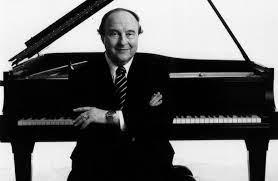

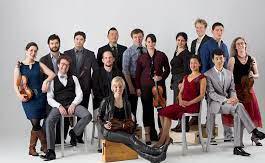

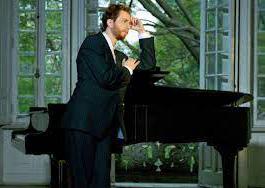

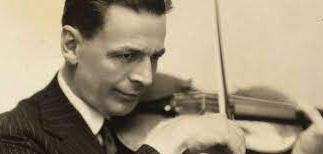
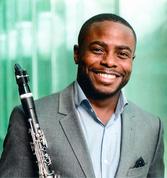
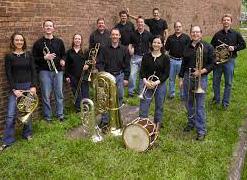
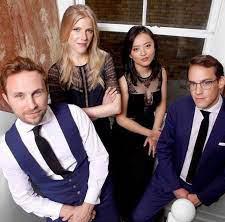


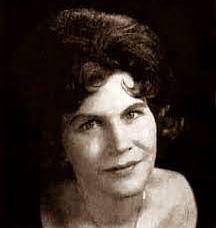
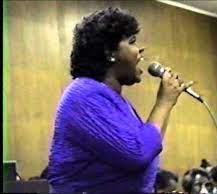
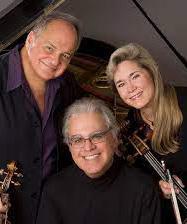
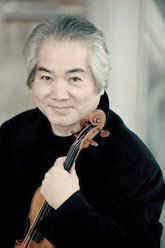
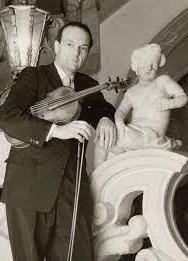



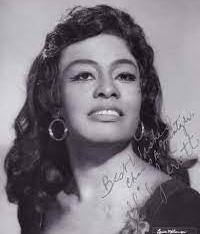


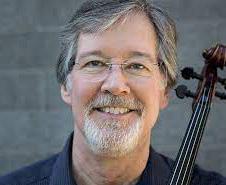

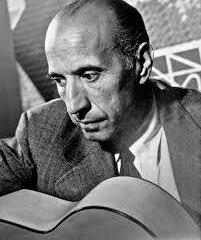
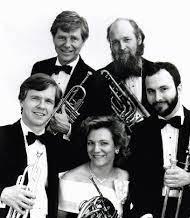
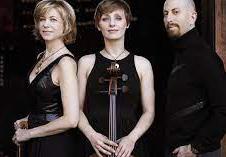



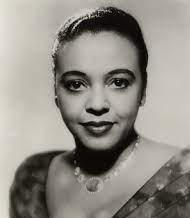




Since our founding in 1948, we have presented... 1,035 Musicians & Soloists 428 Amazing Concerts and 74 Seasons... Presenting The

68
Jennifer Hambrick, Poet Laureate
A poet hailed for her “brilliant” imagery, “masterful” craftsmanship, and “uniquely” musical voice has been engaged to serve as poet laureate for the 75th anniversary season (2022-23) of the world-class Chamber Music Columbus concert series.
“It is an enormous honor to have been invited to write and present a series of poems as poet laureate of the 75th anniversary season of Chamber Music Columbus. I am hugely grateful to Katherine Borst Jones, board president of Chamber Music Columbus, for extending this special commission to me on behalf of Chamber Music Columbus, and for giving me free rein to unleash my musical and poetic gifts in celebration of this milestone in the history of this special organization.” said Hambrick.
As poet laureate of Chamber Music Columbus’ 75th anniversary season, she has written a series of seven poems, one for each of the 2022-23 season’s seven concerts. The poems unite conceptually around the idea of the elements, or raw materials, of chamber music – wood, metal, air, hands, beginnings and endings, time, and space: the wood and metal of musical instruments, the air essential to singing and playing wind instruments (and to life itself), the hands that draw bows across strings or press keys and valves, how music emerges from and returns to untold depths within us, the time in which music and our experiences of it unfold, and the physical space in which every note played or sung finds an acoustical home that enables this special type of music to resonate (literally and figuratively) among us.
These musical elements serve as guiding metaphors in her poems. As such, each element acts as a bridge connecting our experiences with music to our experiences in other aspects of the world around us. Hambrick is a four-time Pushcart Prize and Best of the Net nominee.
Jennifer Hambrick is the author of the poetry collections In the High Weeds, winner of the Stevens Manuscript Award of the National Federation of State Poetry Societies; Joyride (Red Moon Press), currently shortlisted for The Touchstone Distinguished Books Award from The Haiku Foundation; and Unscathed (Night Ballet Press).

She was featured by former U.S. Poet Laureate Ted Kooser in American Life in Poetry; was appointed the inaugural Artist-in-Residence at historic Bryn Du Mansion, Granville; and has received numerous awards and prizes, including the Sheila-Na-Gig Press Poetry Prize (2020), First Prize in the Haiku Society of America’s Haibun Award Competition (2018), First Prize in the 2021 Martin Lucas Haiku Award Competition (U.K.), and many others.
Hambrick is a frequent recipient of poetry commissions, and hundreds of her poems appear in literary journals and invited anthologies around the world. A classical musician, public radio broadcaster, and web producer, she lives in Columbus. Visit JenniferHambrick.com.
9
Cavani String Quartet
PROGRAM
Jennifer Hambrick, Poet Laureate
Ching-chu Hu (born 1969)
The Clarity of Hope: a fanfare to celebrate the 75th season of Chamber Music Columbus (composed 2022) World Premiere
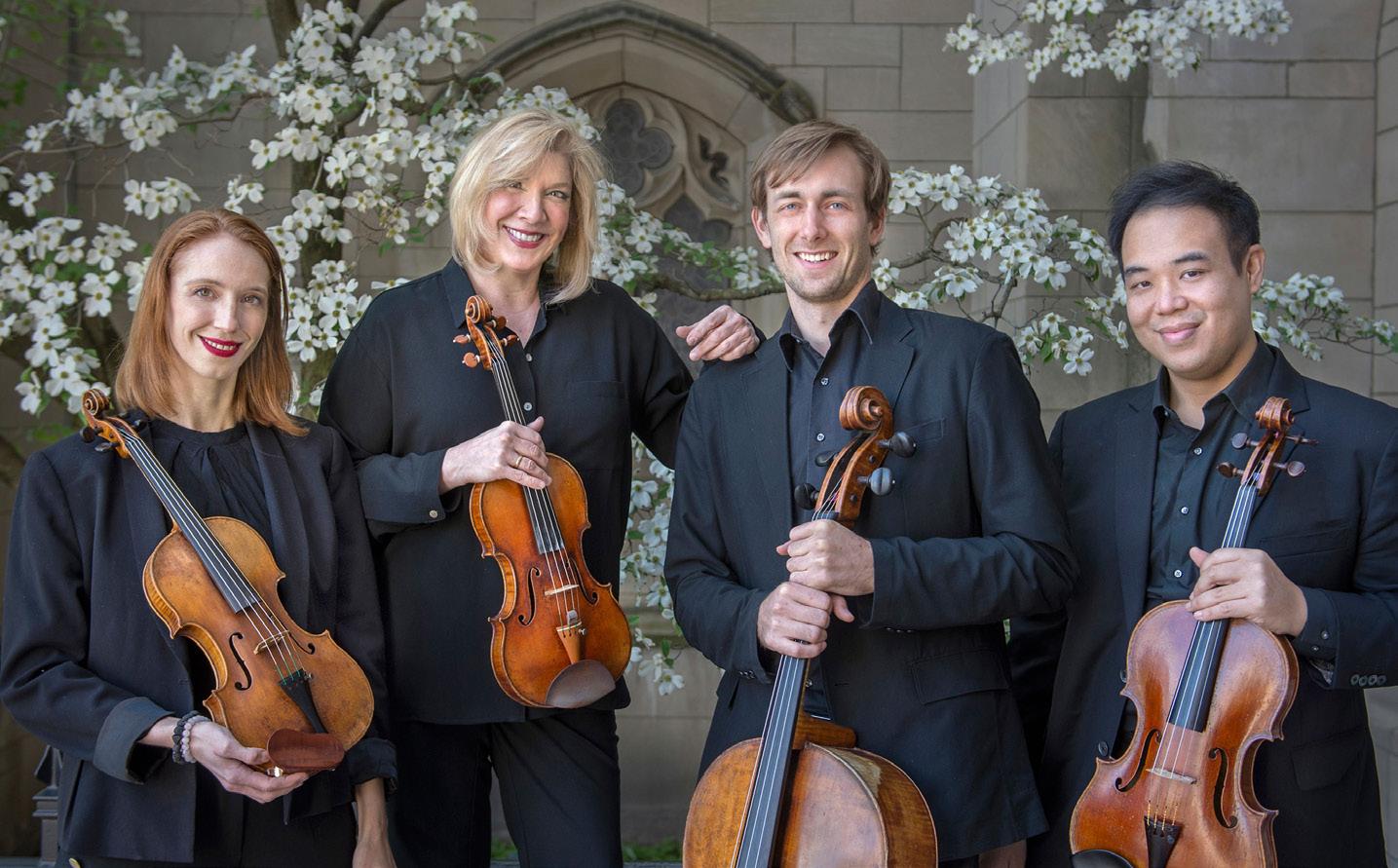
Joseph Bologne, Chevalier de Saint-Georges (1745-1799)
Quartet no. 4 in C minor, op. 1, no. 4 (composed 1772)
Allegro moderato Rondeau
Mark Lomax, II (born 1979)
A Prayer for Love (composed 2022) World Premiere
Louise Toppin, soprano Cavani String Quartet
INTERMISSION
Florence B. Price (1887-1953)
Quartet no. 2 in A minor (composed 1935)
Moderato Andante cantabile Juba. Allegro Finale. Allegro
CAVANI STRING QUARTET - Saturday, January 28, 2023, 4:00 p.m. - Southern Theatre
10
Catherine Cosbey, violin; Annie Fullard, violin; Kyle Price, cello; Eric Wong, viola
Cavani String Quartet
ABOUT THE ARTISTS:
Described by the Washington Post as “completely engrossing, powerful and elegant” the Cavani Quartet’s artistic excellence, generous spirit, and their fervent ambassadorship for great music has placed them among America’s greatest string quartets. The quartet’s more than thirty-year legacy has garnered impressive recognition including The Naumburg Award, Ohio Governors Award for the Arts, Musical America Magazine’s Young Artists of the Year, The Cleveland Quartet Award, ASCAP Award for Adventurous Programming, twice winner of The Guarneri Quartet Award Artistic Excellence, and recipients of more than ten Chamber Music America Residency Partnership Grants. The Cavani Quartet has toured throughout all fifty states, and internationally, performing at some of the world’s most prestigious festivals.
The Cavani Quartet has commissioned, premiered, and performed the music of more than forty living composers, including Josh Henderson, Joan Tower, Donald Erb, and Margaret Brouwer, and collaborated with some of the greatest artists of our time. Passionate leaders in the field of arts advocacy and education, the Cavani Quartet views the empathy and connectivity of chamber music as metaphor for the kind of communication that we should strive for between races, cultures, and nations.
The quartet continues to inspire and shape the musical lives of the next generation through their acclaimed Art of Collaboration Seminar, and soon to be published guidebook, (Oxford University Press - Fall 2023), which emphasizes a teamwork approach to chamber music rehearsal techniques. The Art of Collaboration: Building Empowered Teams is offered as a supplement to the MBA and EMBA Leadership courses at The Weatherhead School of Management at Case Western Reserve University and to Schools of Business around the country.
Deeply committed to providing transformative musical and educational experiences to their own community, The Cavani Quartet assumed the Artistic Directorship of Arts Renaissance Tremont, in 2021 and for more than 30 years, served as faculty Artists-in -Residence at the Cleveland Institute of Music. At CIM the Quartet inaugurated nationally acclaimed programs for student ensembles devoted to the serious study of chamber music including The Intensive Quartet Seminar, The Apprentice Quartet Program, The Art of Collaboration, and The Art of Engagement: Careers and Leadership in Music. The Cavani Quartet is proud and privileged to have taught and mentored members of many distinguished ensembles who have participated in these programs. Innovative programing includes COLLAGE: Music and Poetry, with Poet and Professor of Pan African Studies Mwatabu Okantah, and TEAM UP with MUSIC© to ignite and support instrumental school programs. The Quartet has been on the Advisory Board of Amateur Chamber Music Players and currently serves on the Honorary Board of the Suzuki Association of the Americas and was honored to participate in The Violins of Hope Project (violinsofhopecle. org). For more information, please visit cavanistringquartet.com.
11
Ching-chu Hu, composer

Ching-chu Hu (born Iowa City, Iowa, 1969)
The Clarity of Hope: a fanfare to celebrate the 75th season of Chamber Music Columbus (composed 2022)
Born in 1969 in Iowa City, Iowa, Ching-chu Hu brings his first-generation Chinese American identity to conducting, playing piano, and composing. As he told interviewer Sam Jacobson, “I grew up in the United States, but in a Chinese household where I was speaking Chinese. And the music that was around me that my parents would play was a combination of Chinese folk song, Chinese opera, and Western symphonies. Some of those influences come through, depending on the piece and depending on what the piece is for.”
Hu is the Richard Lucier Endowed Professor of Music at Denison University, director of its music theatre, and director of its famed Vail Series. He has studied at Yale University, Freiburg Musikhochschule in Germany, and University of Iowa, receiving his Doctorate of Musical Arts in Composition at University of Michigan. Among his numerous honors, Hu was an Aaron Copland Fellow at the MacDowell Colony for the Arts, composer-inresidence at the Piccolo Spoleto Festival, guest composer at the American Music Week Festival in Sofia, Bulgaria, and winner of the 2018 American Prize for Chamber Music. Commissioned by Chamber Music Columbus to compose the unifying musical theme for its 75th anniversary season, Hu composed “A Distant Hope,” which received its world premiere by the American Brass Quintet on October 8, 2022. As Hu described in his notes, the work “honors the role of music and hope in our lives. While celebratory as a fanfare, it also deconstructs the various aspects of a fanfare in today’s uncertain world –its excitement, its anticipation, balanced with its repose.”
Hu writes the following about this, the second piece of the puzzle that is the full twomovement “A Distant Hope:”
“The Clarity of Hope,” composed for the Cavani Quartet in celebration of Chamber Music Columbus’ 75th season, honors the lyrical artistry of the quartet. The fanfare is inspired by the first movement of the fanfare, “A Distant Hope,” that opened this season. Each member of the quartet has a moment to shine, as their lines punctuate the energy and anticipation of a fanfare - from its moments of jubilee as well as moments of reflection.
Composer Ching-chu Hu was sponsored by Dr. Richard & Yvonne Heather Burry to compose a 75th anniversary theme to be arranged for each concert and for an opening performance by the American Brass Quintet.
12
Cavani String Quartet
Joseph Bologne, Chevalier de Saint-Georges (born Baillif, Guadeloupe, December 25, 1745; died Paris, June 9, 1799) Quartet no. 4 in C minor, op. 1, no. 4 (composed 1772)
A man of many talents, Joseph Bologne, Chevalier de Saint-Georges, was renowned throughout Europe as a soldier, fencer, violinist, conductor, and composer. The son of a prominent planter in Basse-Terre, Guadeloupe in the French West Indies, George Bologne de Saint-Georges, and his enslaved Senegalese mistress Nanon, Joseph Bologne became a student of the Master of Arms La Boëssière at the age of thirteen. It is thought that he had virtually no musical training until leaving La Boëssière after about six years.
By the time Saint-Georges had turned twenty, François-Joseph Gossec (1734-1829) and Antonio Lolli (1725-1802) had each dedicated works to him. The dedications have led scholars to believe that Saint-Georges had studied composition with Gossec and the violin with Lolli. By 1769, Saint-Georges was a member of Gossec’s new orchestra, the Concert des Amateurs. When Gossec stepped down from leading his orchestra in 1773, Saint-Georges succeeded him.
A year earlier, Saint-Georges debuted as a violin soloist, performing his own first two “Violin Concertos, op. 2.” His first set of six string quartets, published in 1773 as “op. 1,” were among the first to be heard in Paris. These quartets have only two movements, in the case of “Quartet no. 4 in C minor, op. 1, no. 4,” a sonata form “Allegro moderato” and “Rondeau.”
As perhaps the first widely-recognized classical composer of African descent, Saint-Georges faced his share of racial prejudice. His appointment to be the director of the Paris Opéra in 1776 was thwarted by a petition from four of the company’s leading ladies asking Queen Marie Antoinette to save them from “degrading their honour and delicate conscience by having them submit to the orders of a mulatto.” During the French Revolution, Saint-Georges was drawn into the circle of the young Duke of Orléans, Philippe-Egalité.
In 1792, the Paris Assembly appointed him colonel of the Légion des Américains et du Midi, the first all-Black regiment in Europe. Beginning in November 1793, Saint-Georges spent eighteen months as a prisoner, finally gaining release after the fall of Robespierre. In 1795, Saint-Georges traveled back to the Caribbean to join a slave revolt in Saint Domingue (now Haiti), Returning to Paris in 1797, he directed the new orchestra, Cercle de l’Harmonie, but would succumb to a bladder disease in 1799.
13
Dr. Mark Lomax II, composer

Mark Lomax, II (born Blacksburg, Virginia, 1979) A Prayer for Love (composed 2022)
Educator, composer, drummer, activist, and Columbus resident Mark Lomax, II, earned his bachelor’s, master’s, and doctor’s degrees in music from the Ohio State University. “A Prayer for Love” is Lomax’s setting of the 1920 poem “A Prayer” by Claude McKay (1889-1948), about which Lomax has shared the following:
Claude McKay was born in Sunny villa, Jamaica, in 1889. Though born into impoverished circumstances as the son of peasant farmers, McKay was well educated and discovered a writing talent. He became a prominent writer during the Harlem Renaissance whose poetic work protested racial and economic inequities. His poems “To the White Fiends,” “If We Must Die,” and “Harlem Shadows” reflect opposition to racism, oppression, and bigotry.
In searching for a text for this piece, commissioned to celebrate the 75th anniversary of Chamber Music Columbus, my thoughts were focused on how America has changed while remaining the same since the organization’s founding. I am also reminded of the power music has in affecting change in the world. It is in this context that the words of McKay’s poem “A Prayer” resonated deep within my soul. “’Mid the discordant noises of the day I hear thee calling.” This opening line sparked connections as the discordant noises of continued inequities related to race, gender, and class seems to keep the populace distracted from the vital work of being human.
Despite the challenges of being Black, gay, woman, and/or poor, oppressed peoples have always turned to love as the dominant source of power to sustain us in the fight for our humanity. In “A Prayer,” McKay vacillates between the intoxicating feeling of being in love and the desire to live in the present reality. His poem focuses on Eros (romantic love), which is essential. Still, his looking to love for “inward light” broadened my focus. Love power, or, as Dr. King called it, Soul Power, is the only power that can unite humanity.
The poem depends upon the unnamed love for stability, light, truth, and self-control. In a broader context, I believe we should rely on each other for the same. What would the world be like if that were the case? In a world fraught with rising authoritarianism, we need each other more than ever. We need love manifested as agape (universal), Eros (romantic), and philia (platonic). We need as much love as possible for ourselves and each other to overcome all the divisiveness being intentionally generated to keep us powerless.
14
The composition opens with repeating chords that support a chromatic melody. The chords represent the feeling of timelessness that new love brings, and the theme represents uncertainty. This texture devolves into a dissonant and pointillistic texture reflecting the discordant noise of the world. The soprano enters with the first stanza. The mood shifts in the second stanza to a darker feeling, while the third stanza reflects the yearning described in the text. Here there is call and response and mirroring between the viola and the soprano leading to the pizzicato section.
The composition seeks to paint the words and convey sentiments of the romantic love reflected in the poem and a broader sense of love related to that universal power that binds us all. The repetition and harmonies in the fourth stanza signify the desire for unrequited love and a world that has not yet formed. The piece ends as it started, discordant and melancholy. I hope that even though the world is in a state of discord, we will do the daily work to find and show love in all its forms. That is my prayer for humanity.
I’d like to express my sincere gratitude to Chamber Music Columbus for the commission and to soprano Dr. Louise Toppin and the Cavani String Quartet for their impeccable musicianship.
Peace & Power, MLII 2022
This is the world premiere performance of “A Prayer for Love.”
A “Prayer for Love” was commissioned for the Cavani String Quartet and soprano, Louise Toppin, with the generous support of the Peeler Family.
15
Louise Toppin, soprano
Louise Toppin, soprano
Louise Toppin has received critical acclaim for her operatic, orchestral, and oratorio performances throughout the world. She has appeared in recital on many concert series including Carnegie Hall, Merkin Hall, Kennedy Center, Lincoln Center. Orchestral appearances include: the Norrköping Symphony (Sweden), the Czech National Symphony.
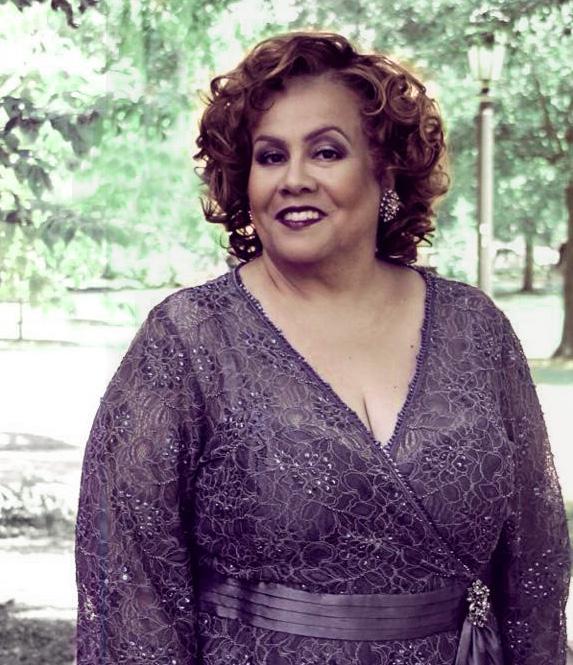
Toppin’s opera roles include: the title role in the world premiere of the opera Luyala by William Banfield, Treemonisha in Scott Joplin’s Treemonisha, Mary in William Grant Still’s Highway One, Maria in the world premiere of Joel Feigin’s opera Twelfth Night, the Queen of the Night in Mozart’s Magic Flute, Donna Anna in Mozart’s Don Giovanni, and Clara in Gershwin’s Porgy and Bess. She most recently was contracted to sing Clara in Gershwin’s Porgy and Bess for Baltimore Opera, Opera Carolina, and Piedmont Opera companies.
For Joanne Rile Artist Management, she tours in “Gershwin on Broadway” with pianist Leon Bates and Robert Sims. She has recorded seventeen compact discs of American music including Songs of Illumination (Centaur Records), More Still (Cambria), Ah love, but a day (Albany), Paul Freeman Introduces… Vol. I and II and Witness (Albany) with the Czech National Symphony, William Grant Still’s opera Highway One (Visionary Records), He’ll Bring it to Pass (Albany Records), Heart on the Wall with the Dvorak Symphony Orchestra (Albany Records), the recording for A Hall Johnson Collection published by Carl Fisher, and La Saison des Fleurs (music for soprano and fortepiano).
Recent performances include the 150th celebration of the ratification of the 13th amendment for Congress and President Obama at the U.S. Capitol; a performance in Havana, Cuba at the new U.S. Ambassador’s residence; and with the women’s orchestra and in featured recitals for Chautauqua Institute and the opening of the Smithsonian’s African American Heritage Museum.
As a scholar, she has lectured on the music of African American composers and has appeared on NPR’s All Things Considered (Margaret Bonds); for many national conventions including the Society for American Music, the Association for the Study of African American Life and History, the American Cultural Association, the National Association of Negro Music, NASPAM; and on many college campuses including Harvard, Tufts, and Duke. She served on several boards including the appointments by four North Carolina Governors to the North Carolina Arts Council, NCAC Executive Board, and the African American Heritage Commission. She is the director of the non-profit organization Videmus, and the administrator for the George Shirley Vocal Competition on African American Art Music in Michigan.
16
Cavani String Quartet
Florence B. Price (born Little Rock, Arkansas, April 9, 1887; died Chicago, June 3, 1953) Quartet no. 2 in A minor (composed 1935)
In 2009, in a little village named St. Anne, Illinois, about sixty miles due south of Chicago, a couple renovating an abandoned house discovered dozens of musical manuscripts and documents bearing the name Florence Price. The couple did a bit of searching on the web, discovering that Price had died in 1953 and that some of her papers were housed at the University of Arkansas. The archivists in Fayetteville realized that dozens of Price works long believed to have been lost had suddenly been rediscovered. ”She is widely cited as one of the first African-American classical composers to win national attention, and she was unquestionably the first black woman to be so recognized,” wrote “The New Yorker” music critic Alex Ross in 2018. “Not only did Price fail to enter the canon; a large quantity of her music came perilously close to obliteration.”
But as Ross and others have pointed out, keeping composers such as Florence Price, a woman and an African American, out of the canon has never been mere forgetfulness. It has instead been an intentional choice. Ross asks, “If racism and misogyny had not so profoundly defined European and American culture, would as many white male composers have prospered?”
Price’s mother was a music teacher and her father a dentist. By the age of four, Price had given her first piano performance. By the time she graduated from her segregated Catholic high school as her class valedictorian, her first works had been published. In 1903, she went to Boston to attend the New England Conservatory of Music, graduating in 1906 with a soloist’s diploma in organ and a teacher’s diploma in piano. On June 15, 1933, Price became the first Black woman to have an orchestral work, her “Symphony no. 1 in E minor,” performed by a major ensemble, the Chicago Symphony Orchestra conducted by Frederick Stock.
The University of Arkansas holds the manuscript score of “Quartet no. 2 in A minor,” dated September 4-October 8, 1935. The first movement, marked “Moderato,” opens with a moody repeated phrase in the second violin that eventually leads to a lyrical second subject marked by distinctly “blue” notes. The “Andante cantabile” second movement melds early twentieth century dissonance with Black harmonies, The third movement, marked “Allegro,” takes both title and spirit from the African “Juba” dance that traditionally incorporated clapping and other forms of bodily percussion. The “Allegro” finale is a heartfelt rondo. --ProgramnotesbyJayWeitz,SeniorConsultingDatabaseSpecialistformusic,OCLCOnline
inCentralOhioforthedailypapers“ColumbusCitizen-Journal”and“ColumbusDispatch,”the
News,”andColumbuspublicradiostationWCBE-FM. In2019,theMusicLibraryAssociation awardedhimitslifetimeachievementawardandhighesthonor,theMLACitation.
ComputerLibraryCenter,Dublin,Ohio.
17
Foroverthreedecades,hehaswrittenaboutthearts
alternativeweeklypapers“ColumbusGuardian”and“ColumbusAlive,”the“ColumbusJewish


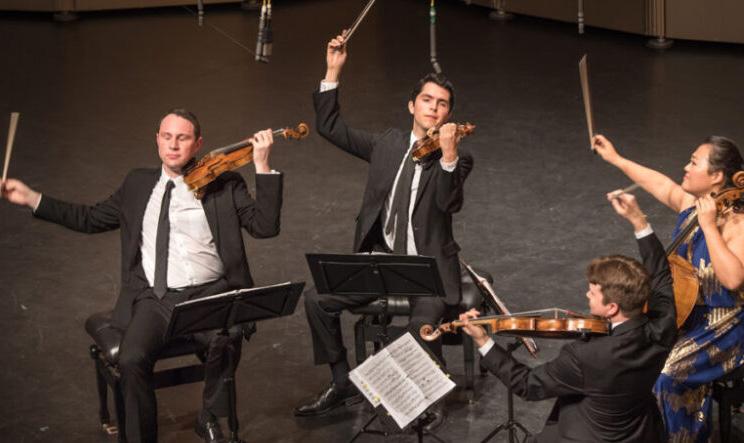

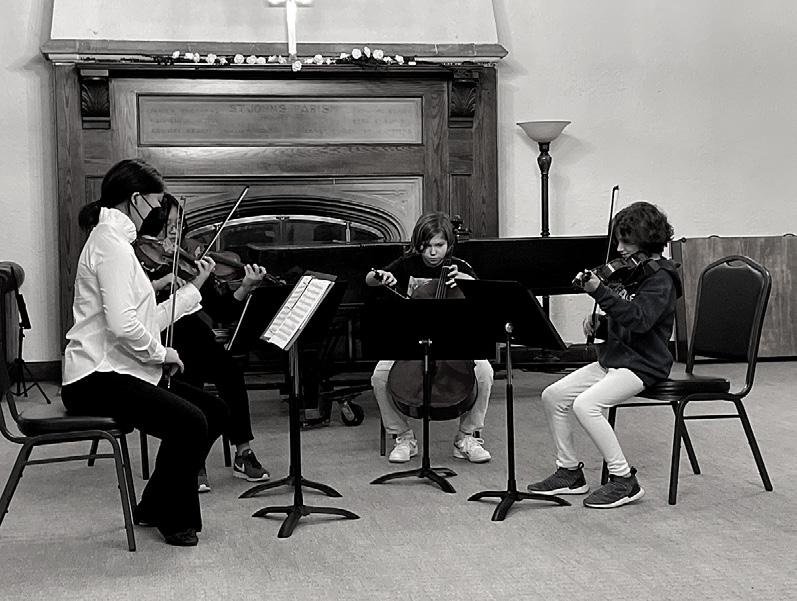


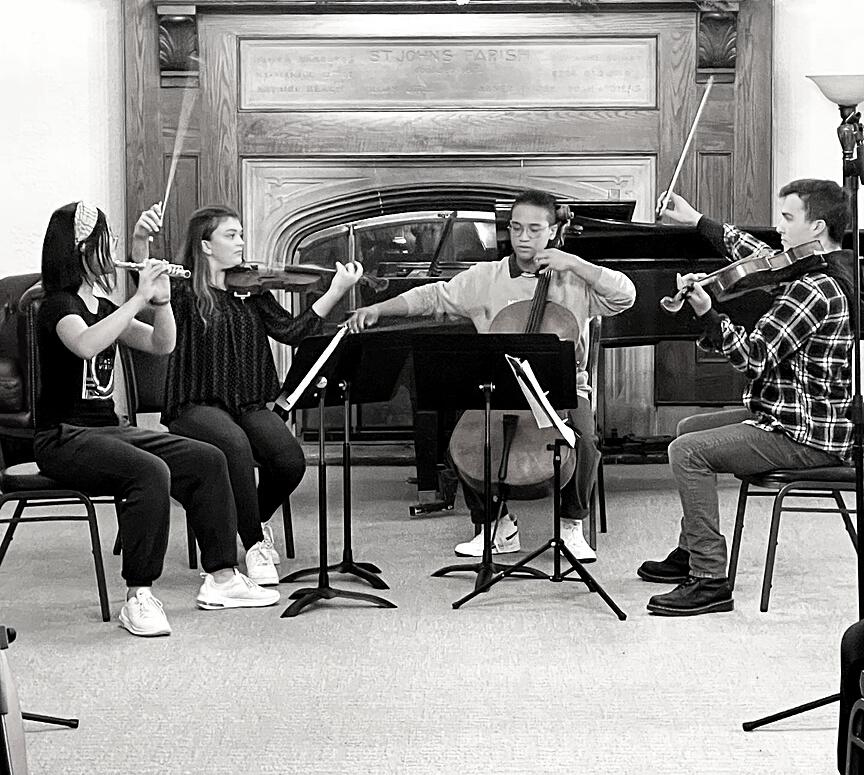
ANNIVE R SARY COLUMBUS Tickets & Info « Scan for tickets & more info or visit ChamberMusicColumbus.org Calidore String Quartet and Composer Huw Watkins April 1, 2023 @ 7pm Merz Trio and Composer Karim Al-Zand May 6, 2023 @ 7pm Open to Students of all ages and abilities, any instrument. No audition required! where young musicians flourish Chamber Music Columbus and other financial need-based scholarships are available! CMC prides itself on offering the most personalized, accessible, and high-quality chamber music programs possible for our students. Over the course of its 31-year history, CMC continues to connect students and professionals locally, nationally, and internationally. CMC proudly salutes our decades-long partnership with Chamber Music Columbus as they celebrate their 75th Season! Check out cmconnection.org for information on our upcoming programs and concerts! Looking for music for your special event? CMC provides highquality musical entertainment. Visit cmconnection.org/gigs
for Extraordinary Service
18
2018 Recipient of the Chamber Music Society of Lincoln Center Award
in Chamber Music




Come see the new home of classical music in Central Ohio Schedule your tour at wosu.org/tours SEASON SUPPORTERS TICKETS 614-469-0939 • capa.com • CAPA Ticket Center 39 E. State St., Columbus, OH 43215 congratulates Chamber Music Columbus on 75 years! chamber.4x3.winter22-23program-GeorgeWinston.indd 1 11/29/22 3:11 PM
Callisto Quartet

PROGRAM
Jennifer Hambrick, Poet Laureate
Ching-chu Hu (born 1969)
As Hope Builds: a fanfare to celebrate the 75th season of Chamber Music Columbus (composed 2022) World Premiere
Joseph Haydn (1732-1809)
Quartet in F major, op. 77, no. 2 (H. III: 82) (composed 1799) Allegro moderato
Menuetto: Presto, ma non troppo; Trio Andante
Finale: Vivace assai
Korine Fujiwara
Sunsets, Like Childhood (composed 2022) World Premiere
CommissionedbyCaroleWilhelminlovingmemoryofherhusband,Bob,bothlongtime supporters of Chamber Music Columbus.
INTERMISSION
Claude Debussy (1862-1918)
Quartet in G minor, op. 10 (composed 1893)
Animé et très décidé
Assez vif et bien rythmé
Andantino, doucement expressif
Très modéré – En animant peu à peu – Très mouvementé et avec passion
20
CALLISTO QUARTET - Saturday, February 18, 2023, 4:00 p.m. - Southern Theatre
Greg Lewis, violin; Hannah Moses, cello; Cameron Daly, violin; Eva Kennedy, viola
Callisto Quartet
ABOUT THE ARTISTS:
Praised for their “lush intensity and bravado” and the “cohesion and intonation one might expect from an ensemble twice their age” (Third Coast Review), the American/Canadian Callisto Quartet brings together four musicians who share a deep passion for bringing chamber music to audiences around the world. Since their inception in 2016, Callisto has garnered top prizes in nearly every major international chamber music competition and has been hailed by audiences across the globe. Grand Prize winners of the 2018 Fischoff National Chamber Music Competition and Second Prize Winners of the 2019 Banff International String Quartet Competition, the Callisto Quartet has also taken home prizes from the Bordeaux, Melbourne, and Wigmore Hall competitions. Callisto has previously held residencies at Rice University’s Shepherd School of Music and the Escuela Superior de Música Reina Sofía in Madrid, Spain. From 2020-2022 Callisto was the Ernst Stiefel Quartet in Residence at Caramoor Center for Music and Arts, where they were the first quartet to perform all six string quartets of Bartòk at Caramoor.
Notable appearances include Carnegie’s Weill Recital Hall, the Kennedy Center, the Schneider Concert Series, Ravinia Festival, and the Heidelberg String Quartet Festival. Additionally, Callisto has been invited to perform at renowned chamber music festivals throughout North America and Europe, such as the La Jolla Music Society Summerfest, the Great Lakes Chamber Music Festival, the Emilia Romagna Festival, the Jeunesses Musicales Deutschland Chamber Music Campus. At the invitation of Gerhard Schulz, they attended the 2018 Prussia Cove International Musicians Seminar where they also worked with Gidon Kremer and Thomas Adès. In 2021, Callisto performed a series of concerts in Berlin and Schleswig-Holstein, Germany, at the Musethica International Chamber Music Festival, where they collaborated closely with Avri Levitan. Callisto has been honored to collaborate with many legendary artists, including cellist David Geringas at the Cleveland Cello Society’s 20th anniversary concert and clarinetist Franklin Cohen on the ChamberFest Cleveland Series. Over the 2018-2019 seasons at the Great Lakes Chamber Music Festival they have shared the stage with musicians such as Paul Watkins, Lawrence Power, Gilles Vonsattel, and John Novacek. In 2021, Callisto recorded Schubert’s Cello Quintet with Desmond Hoebig for the 2021 Banff International String Quartet Festival.
The Callisto Quartet is committed to continually broadening their musical horizons by drawing inspiration from a plethora of mentors and musical approaches. They are also dedicated educators and believe in the importance of mentoring students and connecting with audiences in a meaningful way. Callisto most recently developed a unique chamber music curriculum entitled “Chamber Music Deconstructed: a Comprehensive Curriculum developed by the Callisto Quartet”, which they implemented during their 2021-22 teaching residency at the Fine Arts Center in Greenville, SC, and are currently bringing to other schools across the United States. Currently, Callisto is the Quartet in Residence at the Suzuki Music School of Westport, where they head the chamber music program.
21
Ching-chu Hu, composer
Ching-chu Hu (born Iowa City, Iowa, 1969)
As Hope Builds: a fanfare to celebrate the 75th season of Chamber Music Columbus (composed 2022)
Born in 1969 in Iowa City, Iowa, Ching-chu Hu brings his first-generation Chinese American identity to conducting, playing piano, and composing. As he told interviewer Sam Jacobson, “I grew up in the United States, but in a Chinese household where I was speaking Chinese. And the music that was around me that my parents would play was a combination of Chinese folk song, Chinese opera, and Western symphonies. Some of those influences come through, depending on the piece and depending on what the piece is for.”
Hu is the Richard Lucier Endowed Professor of Music at Denison University, director of its music theatre, and director of its famed Vail Series. He has studied at Yale University, Freiburg Musikhochschule in Germany, and University of Iowa, receiving his Doctor of Musical Arts in Composition at University of Michigan. Among his numerous honors, Hu was an Aaron Copland Fellow at the MacDowell Colony for the Arts, composer-inresidence at the Piccolo Spoleto Festival, guest composer at the American Music Week Festival in Sofia, Bulgaria, and winner of the 2018 American Prize for Chamber Music.
Commissioned by Chamber Music Columbus to compose the unifying musical theme for its 75th anniversary season, Hu composed “A Distant Hope.” As Hu described in his notes, the work “honors the role of music and hope in our lives. While celebratory as a fanfare, it also deconstructs the various aspects of a fanfare in today’s uncertain world – its excitement, its anticipation, balanced with its repose.”

Hu writes the following about “As Hope Builds,” the third piece of the puzzle that is the full two-movement “A Distant Hope:”
“As Hope Builds” is inspired by the second movement of “A Distant Hope,” which opened the 75th anniversary season of Chamber Music Columbus last fall. Written for the amazing St. Lawrence Quartet, each moment is a composite of separate intricate lines that form a texture of forward momentum and joy. Each artist soars in their solos that are supported by the other members of the quartet as the textures build to a thrilling conclusion.
“A Distant Hope” received its world premiere by the American Brass Quintet on October 8, 2022. This is the world premiere performance of “As Hope Builds.”
22
Callisto Quartet
Joseph Haydn (born Rohrau, Austria, March 31, 1732; died Vienna, May 31, 1809) Quartet in F major, op. 77, no. 2 (H. III: 82) (composed 1799)
The “Quartet in F major, op. 77, no. 2” was destined to be the last instrumental work Haydn would complete. He had projected a set of six quartets dedicated to Prince Franz Joseph Lobkowitz, soon to be the great patron of Beethoven. But while working on his oratorio “Die Jahreszeiten,” Haydn suffered a breakdown from which he never fully recovered. The quartet, in fact, reflects the strong influence of the vocal works Haydn was working on at the time, especially the aforementioned oratorio and the “Theresien-Messe.” It also pays direct tribute right at the beginning to the “Catalogue Aria” from Mozart’s “Don Giovanni.” And as if to prove that Haydn never stopped experimenting, he reversed the order of the two middle movements that he had used exclusively since the “Quartets op. 71.” In this final quartet, he reverted to the style of his “Quartets, opus 9,” where the minuet preceded the slow movement.
In the “Allegro moderato,” that Mozart tribute generates a countersubject in the second violin that eventually launches into an unusual series of chromatic modulations. The minuet has the jocular rhythmic feel of a Beethoven scherzo with all sorts of textural variety. The more lyrical trio, in the remote key of D-flat major, makes its way quietly back to the F major of the minuet.
The “Andante” is the only theme and variations movement to be found in Haydn’s later quartets and opens with the spare harmonies of the cello and first violin alone. Out of the complete statement of the theme and after each of the two variations, a developmental episode grows. The first variation begins in the second violin; the second variation finds the first violin playing triplets behind the cello’s lead.
Syncopations abound in the “Finale,” which springs to life with a loud F major chord. The polonaise-like first theme wanders between duple and triple time until the latter establishes itself. The development is highly contrapuntal and leads to a recap that is itself a second development, longer than the exposition. This may have been Haydn’s final completed string quartet, but it shows no signs of old age.
23
Korine Fujiwara, composer
Korine Fujiwara (born Billings, Montana) Sunsets, Like Childhood (composed 2022)
Founding violist of Columbus’s own Carpe Diem String Quartet, Korine Fujiwara earned her Bachelor of Music from Northwestern University and her Master of Music from the Juilliard School. Her first orchestral position was with the Brooklyn Philharmonic, after which she was a principal player and soloist with the ProMusica Chamber Orchestra of Columbus. Beginning in 2001, she was a member of the Columbus Symphony Orchestra, eventually holding the position of Acting Assistant Principal Second Violin.
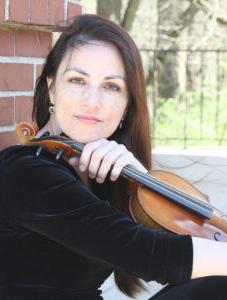
Ms. Fujiwara is currently Professor of Violin and Viola at Pacific Lutheran University in Tacoma, Washington. Before that, she was an Instructor of Violin and Viola at Ohio Wesleyan University. She has received the Hjalmer and Emma Kivekas Award, the Raymond Cerf Memorial Scholarship in Violin, and Northwestern’s Wade Fetzer Prize as outstanding performer in her graduating class. She was named one of “25 Contemporary Composers to Watch” by “Strings Magazine.”
“Sunsets, Like Childhood” takes its title from a quotation by Richard Paul Evans, best-selling author of “The Christmas Box:” “Sunsets, like childhood, are viewed with wonder not just because they are beautiful but because they are fleeting.” Composer Fujiwara has written the following about “Sunsets, Like Childhood:”
Taking a moment every day to capture the sunset sky painted in glorious colors is an easy way to enjoy one of life’s free gifts. In “Sunsets Like Childhood” I’ve tried to capture that explosion of color in music. Dedicated to those who, instead of always running from the inevitable, have chosen to run towards life. Chase the sunsets.
Marked “Moderato,” “Sunsets, Like Childhood” was “Commissioned by Chamber Music Columbus for St. Lawrence String Quartet with financing provided by Carole Wilhelm in memory of Robert G. Wilhelm to celebrate Chamber Music Columbus’s 75th anniversary.” Robert Wilhelm, who was Chamber Music Columbus President from 2003 to 2007, passed away on August 20, 2018. Between the time of the commission and the time of this performance, Carole Wilhelm has also passed away. This is the world premiere performance of “Sunsets, Like Childhood.”
24
Callisto Quartet
Claude Debussy (born St. Germain-en-Laye, August 22, 1862; died Paris, March 25, 1918) Quartet in G minor, op. 10 (composed 1893)
The fact that Claude Debussy published his only string quartet under the title “Premier Quatuor” suggests that he intended to venture at least once more into that genre at some point in his career. When fellow composer Ernest Chausson (1855-1899) expressed dismay at the “Quartet in G minor,” Debussy wrote that his next such work would prove more worthy of his friend’s respect. When the two had a falling out, however, Debussy apparently abandoned plans for a second quartet. The one that does exist has since become one of the most important and popular quartets in the repertoire.
In the opening moments of the first movement of the quartet (“Animé et très décidé” -animated and very determined) can be found the seeds for virtually the entire work. A fluid melody is passed from violin to cello. The second subject is restated in the development, neglected in the recap, and finally returns in the coda. The rhythmically fascinating scherzo (“Assez vif et bien rytmé” -- rather lively and rhythmic) opens with the bowed viola over pizzicato accompaniment. The viola theme, derived from the opening movement’s germ motif, later evolves into an augmented version in the first violin.
The “Andantino, doucement expressif” (gently expressive), which opens and closes with muted strings, seems furthest away from the initial seed measures of the first movement, although some commentators have found a connection. The introduction to the finale (“Très modére” -- very moderate) reverts to the overt use of the seed passage, then moves to a fugato setting in the cello. The second subject again treats the seed motif. It is Debussy’s employment of uncommon juxtapositions of common chords, his use of modal flavors, and the influences ranging from Wagner’s cyclic forms to the textures of the Javanese gamelan that have helped establish his lone quartet as one of the cornerstones of the literature.
--ProgramnotesbyJayWeitz,SeniorConsultingDatabaseSpecialistformusic,OCLC OnlineComputerLibraryCenter,Dublin,Ohio. Foroverthreedecades,hehaswritten abouttheartsinCentralOhioforthedailypapers“ColumbusCitizen-Journal”and “ColumbusDispatch,”thealternativeweeklypapers“ColumbusGuardian”and“Columbus Alive,”the“ColumbusJewishNews,”andColumbuspublicradiostationWCBE-FM. In 2019,theMusicLibraryAssociationawardedhimitslifetimeachievementawardand highesthonor,theMLACitation.
The Callisto Quartet (CallistoQuartet.com) is presented by special arrangement with Earl Blackburn of Kanzen Arts, 67-26 Exeter Street, Forest Hills, New York 11375 (KanzenArts.com).
25
State and federal dollars through the Ohio Arts Council support artistic resources throughout the state.
State and federal dollars through the Ohio Arts Council support artistic resources throughout the state.
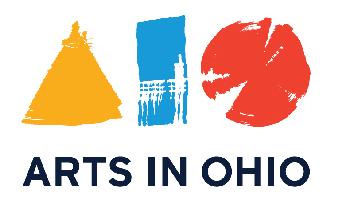
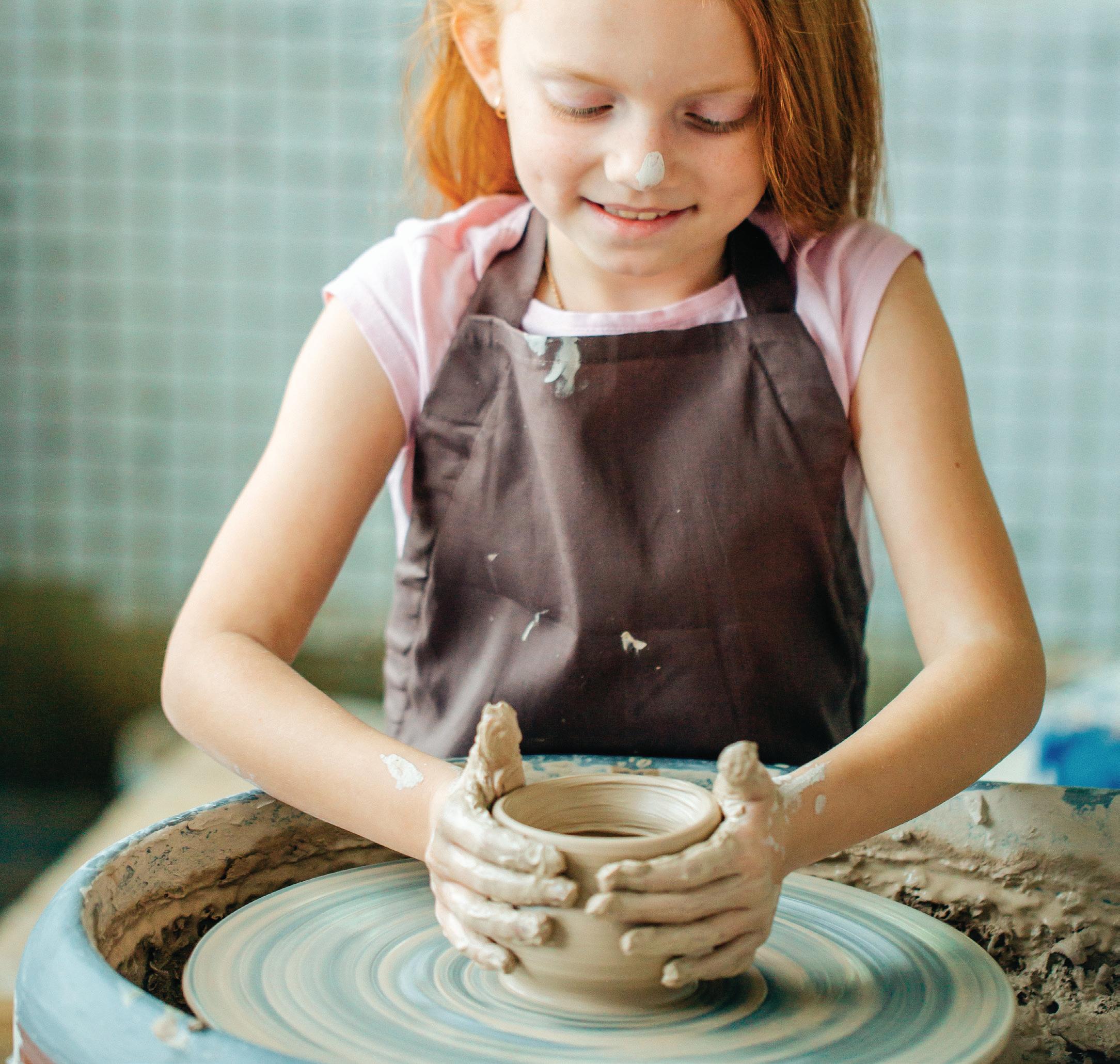

Happy 75th anniversary, Chamber Music Columbus!
Happy 75th anniversary, Chamber Music Columbus!
Thank you for all you do for the arts in Ohio.
Thank you for all you do for the arts in Ohio.
Happy 75th anniversary, Chamber Music Columbus! Thank you for all you do for the arts in Ohio.













































































